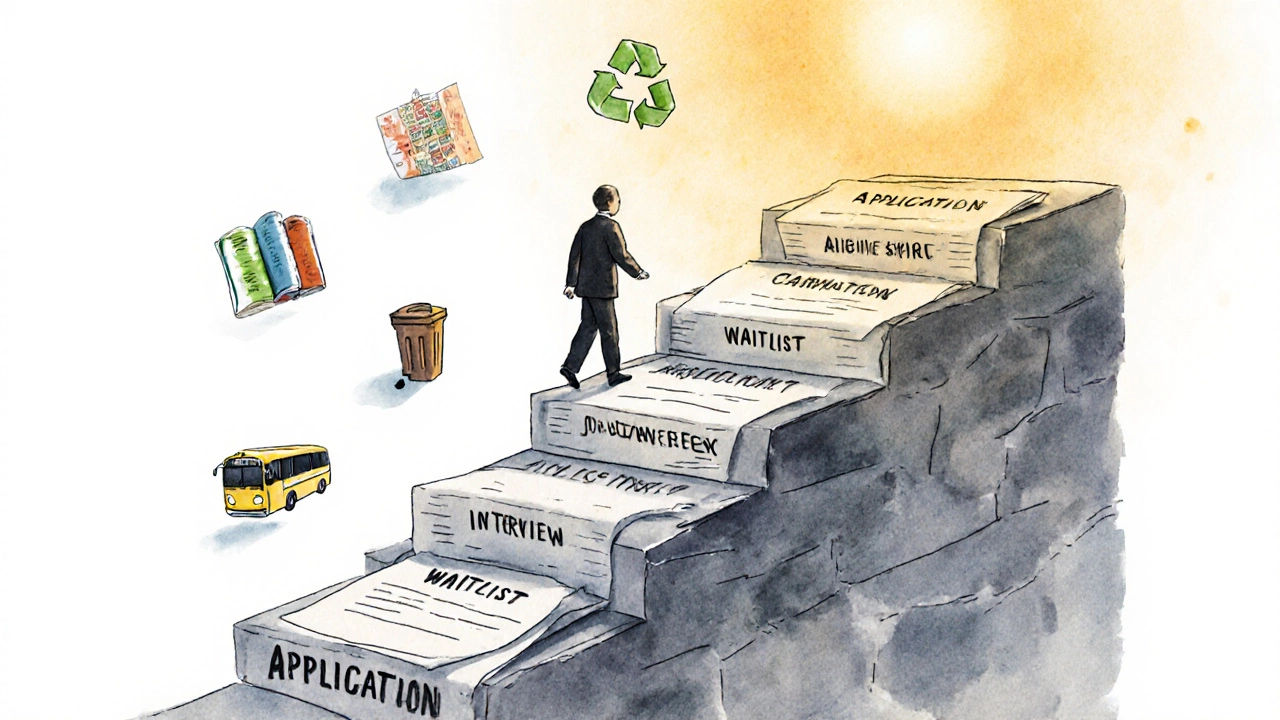Getting a job in local government isn’t like applying for a role at a private company. There are no flashy interviews or stock options. But there’s stability, benefits, and real impact - especially if you care about your community. In 2025, councils across Australia are hiring for roles in planning, environmental services, community programs, finance, IT, and even customer service. The catch? The process is slow, bureaucratic, and often misunderstood. If you’ve ever wondered how to actually land one of these jobs, here’s how it works - no fluff, no theory, just what you need to do.
Understand what local government actually does
Most people think local government means garbage collection and parking permits. That’s only part of it. Local councils manage libraries, parks, child care centers, public health programs, housing support, waste recycling, local roads, emergency planning, and even arts festivals. They employ engineers, social workers, GIS specialists, policy officers, financial analysts, and communications coordinators. The roles are diverse, but they all serve the same goal: making life better for residents in your suburb or town.
If you’re serious about applying, pick a department that matches your skills. Don’t just apply to every opening. If you have a background in accounting, look at finance or audit roles. If you’ve worked in customer service, check out front-counter or call center positions. If you’re into tech, digital services and data management are growing fast.
Find the right job listings
You won’t find local government jobs on Seek or LinkedIn as often as you’d expect. Most are posted directly on council websites. In South Australia, for example, Adelaide City Council, Marion Council, and Port Adelaide Enfield all have their own careers pages. Each one lists current openings, application deadlines, and required documents.
Set up email alerts on your top 3-5 council websites. Bookmark them. Check them weekly. Jobs often appear on Mondays or Tuesdays and close within 10-14 days. Some councils also list roles on Jobs NSW, Victorian Public Service, or Queensland Government Careers portals if you’re open to relocating.
Don’t ignore state government portals like Public Sector Jobs SA. Many local government roles are advertised there too, especially for senior or specialized positions.
Meet the basic requirements
Most local government jobs require:
- Australian citizenship or permanent residency
- A clean police check (you’ll need to apply for one)
- A valid driver’s license (for most roles, even if you don’t drive daily)
- Basic computer skills (Word, Excel, email systems)
For entry-level roles like administration assistant or community officer, a Certificate III or IV might be enough. For planners, engineers, or project managers, you’ll need a degree - usually in urban planning, environmental science, public administration, or engineering.
Don’t assume you’re too qualified or not qualified enough. Many people walk away from applying because they think they don’t have the right degree. But councils often hire people with transferable skills. A retail manager can become a customer service officer. A teacher can become a community engagement officer.

Write a government-style resume
Government resumes are different. They’re not about buzzwords or design. They’re about matching your experience to the selection criteria.
Every job posting includes a list of “Key Selection Criteria.” These are the exact skills and experiences they’re looking for. Your resume must answer each one - clearly and with examples.
Use this structure for each criterion:
- What they want: “Experience managing community consultation processes.”
- Your example: “Led 12 community forums for the redevelopment of West Beach Park, collecting 300+ feedback forms and presenting findings to council.”
- Result: “Result: 92% community approval rating in post-project survey.”
Don’t just list your job duties. Show impact. Use numbers. Use real projects. Avoid vague phrases like “worked well in teams.” Say: “Collaborated with 5 departments to deliver a 6-month waste reduction campaign that cut landfill use by 18%.”
Keep your resume to 3-4 pages max. Use plain formatting. No graphics. No photos. No fancy fonts. Council HR teams scan hundreds of these. Make it easy to read.
Prepare for the interview - it’s not what you think
Local government interviews are structured. You’ll be asked the same questions as everyone else, and you’ll be scored on how well you match the selection criteria.
Expect questions like:
- “Tell us about a time you handled a difficult community complaint.”
- “How do you prioritize tasks when multiple deadlines clash?”
- “Describe a project where you had to work with limited resources.”
Use the STAR method to answer:
- Situation
- Task
- Action
- Result
Practice out loud. Record yourself. Time your answers - 2 to 3 minutes per question is ideal. Don’t ramble. Don’t make excuses. Be honest. If you haven’t done something before, say so - then explain how you’d learn it.
Also, dress professionally. Even if the job is in maintenance or fieldwork, wear a shirt and tie or a blouse and blazer. It shows you take it seriously.
Know the culture
Local government isn’t fast-paced like a startup. It’s deliberate. Decisions go through committees. Budgets are reviewed quarterly. Change happens slowly. If you thrive on chaos, this might not be for you.
But if you value consistency, public service, and long-term impact - you’ll fit right in. Staff are often loyal. Many stay for 15-20 years. Benefits include:
- Generous leave (4-6 weeks annual leave, plus public holidays)
- Flexible hours (many roles offer part-time or hybrid options)
- Superannuation contributions (12% or more)
- Professional development funding
- On-site gym, subsidized meals, or childcare
During interviews, show you understand this culture. Say things like: “I appreciate how local government builds trust through transparency,” or “I’m motivated by outcomes that last beyond a single term.”

Apply even if you’re not perfect
The biggest mistake people make? Not applying because they think they’re not “qualified enough.”
Here’s the truth: councils often hire people who meet 70% of the criteria. They know they can train you on the rest. If you’ve got the attitude, the work ethic, and the willingness to learn - you have a real shot.
One person I know applied for a community development role with no formal experience. She had volunteered at a local food bank for 3 years. She wrote her application around that. Got the job. Now she runs the council’s food security program.
You don’t need a perfect resume. You need a clear, honest, well-structured application that shows you care.
What happens after you apply?
The process can take 6-12 weeks. Don’t panic if you don’t hear back right away. Councils often have long approval chains. If you’re not selected, ask for feedback. Most will give it if you email politely.
Rejection isn’t the end. Use it to improve. Update your resume. Practice more interviews. Apply again next time. Many successful applicants applied 3-5 times before getting hired.
And if you’re still stuck? Volunteer with your local council. Join a community advisory group. Attend a council meeting. Make connections. People notice. Sometimes, a recommendation from a council staff member can open a door that an application can’t.
Final tip: Start small, think long-term
You don’t need to land a senior role right away. Many people start as administration assistants, customer service officers, or casual field workers. From there, you can move into project coordination, then policy, then management.
Local government is a ladder. You climb it slowly, but you climb it for life. And when you do, you’re not just working for a boss - you’re helping shape the place where your kids go to school, your neighbors walk their dogs, and your community comes together.
That’s worth the wait.
